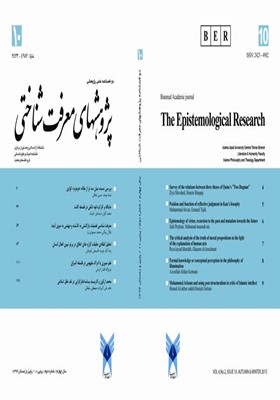بررسی نسبت میان سه تز از مقاله «دوجزم»کواین
محورهای موضوعی : پژوهشهای معرفت شناختی
1 - استاد فلسفه و منطق مؤسسه پژوهشی حکمت و فلسفه ایران
2 - دکترای فلسفه از مؤسسه پژوهشی حکمت و فلسفه
کلید واژه: کل گرایی معرفت شناختی, کل گرایی معنایی, رد تمایز تحلیلیـترکیبی, اتمیسم معنایی,
چکیده مقاله :
مباحث این مقاله متمرکز بر مقاله دو جزم تجربهگرایی کواین است. ما کلگرایی کواین را مورد بررسی قرار میدهیم. کلگرایی او دو بعد دارد: کلگرایی معرفتشناختی و کلگرایی معنایی. تز سومی که مورد بررسی ما قرار میگیرد، عدم تمایز تحلیلیـترکیبی است. فودور و لپور با دو تز کل گرایی معرفتشناختی و عدم تمایز تحلیلیـترکیبی مخالفتی ندارند اما مدعی هستند: الف) عدم تمایز تحلیلیـترکیبی، مقدمه کلگرایی معرفتشناختی کواین است. ب) هرچند کلگرایی معرفتشناختی کواین مقدمه کلگرایی معنایی او دانسته میشود، ولی این استنتاج قابل دفاع نیست. از سوی دیگر اوکاشا و بکر نشان میدهند: الف) کلگرایی معرفتشناختی کواین مقدمه عدم تمایز تحلیلیـترکیبی او است. ب) استنتاج کلگرایی معنایی از کلگرایی معرفتشناختی، قابل دفاع است. ما در این مقاله اولاً، هر دو دعوی فودور و لپور را رد و از دعاوی اوکاشا و بکر حمایت میکنیم و ثانیاً، یک ادعا را بر دعاوی اوکاشا و بکر میافزاییم، مبنی بر اینکه عدم تمایز تحلیلیـترکیبی و کلگرایی معنایی (که هر دو مبتنی بر کلگرایی معرفتشناختی هستند)، درواقع یک تز هستند.
This article is focused on Quine's "Two dogmas of empiricism". We discuss about his holism.His holism has two aspects: epistemological holism (EH) and meaning holism (MH). The third thesis that we discuss about is "Rejection of the analytic–synthetic distinction" (RASD). Fodor & Lepore (1993) have not opposed EH and RASD, but they claim: a) RASD is a premise for EH argument. b) Although Quine's EH is regarded as a premise for his MH argument, but this argument is not defensible. On the other hand, Okasha (2000) and Becker (2001) show: (a) Quine's EH is a premise for his RASD argument. (b) The inference of MH from EH is defensible. At this article: (a) both claims of Fodor and Lepore, have been rejected and defended of the claims of Okasha and Becker, and (b) added a claim: RASD and MH (the both is based on EH) are the same, in fact, they are one thesis.
Ayer, Alfred Jules (1952) Language, Truth and Logic, New York: Dover Publications.
Becker, K. (2001) “Understanding Quine’s famous statement”, Erkenntnis, 55: 73–84, Kluwer Academic Publishers.
Cozzo, Cesare (2002) Does Epistemological Holism Lead to Meaning-Holism?, http://philpapers.org/archive/COZDEH.pdf.
Creath, Richard (2011) “Logical Empiricism”, Stanford Encyclopedia of Philosophy, http://plato.stanford.edu/entries/logical-empiricism.
De Rosa, Raffaella and Lepore, Ernest (2006) “Quine’s Meaning Holism”, The Cambridge Companion to Quine. Cambridge Unoversity Press.
Fodor, Jerry and Lepore, Ernest (1993) Holism, a Shopper’s Guide, Oxford and Cambridge: Blackwell,
Hylton, Peter (2007) Quine, New York: Routledge.
Markie, Peter (2008) “Rationalism vs. Empiricism”, Stanford Encyclopedia of Philosophy, http://plato.stanford.edu/entries/rationalism-empiricism.
Okasha, S. (2000) “Holism about Meaning and about Evidence: in Defence of W.V.Quine”, Erkenntnis, 52: 39–61.
Orenstein, Alex (1998) “Quine, Wilard van Orman”, Rutledge Encyclopedia of Philosophy, edited by By Edward Craig, London: Routledge; https://www.rep.routledge.com/contributor/orenstein-alex.
Quine, W. V. (1962) “A Comment on Grunbaum’s Claim”, in S. G. Harding (ed.) Can Theories be Refuted?, Reidel, Dordrecht, Holland (1976).
-------. (1963) “Two Dogmas of Empiricism” in From a Logical Point of View, New York and Evanston: Harper and Row, pp.20-46.
Raatikainen, Panu (2003/ Fall) “Is Quine a verificationist?”, The Southern Journal of Philosophy, Vol. 41, Issue 3, pp.399-409;
http://onlinelibrary.wiley.com/doi/10.1111/j.2041-6962.2003.tb00959.x/pdf.

